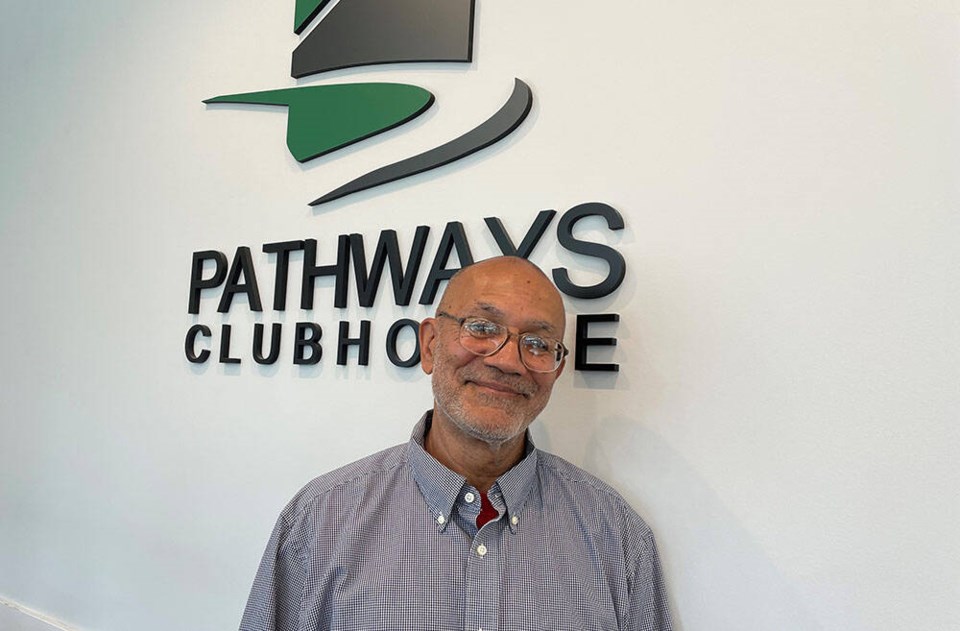Warning: This story deals with the subject of suicide.
Richmond resident Karim Jessa is concerned that Canada will allow medical assistance in dying (MAiD) for people struggling with their mental health next March.
If you’d asked him six years ago, however, it might have been a different story.
And that’s his main point: When he got the right help for his mental illness, he no longer wanted to die.
In 2017, his marriage had broken down, he had been unemployed for a long time and he had no steady housing.
He had hit rock bottom, and he told the Richmond News it was only because he was a “coward” that he didn’t take his life at that point.
But, since then, he has connected with Pathways Clubhouse and has slowly found meaning in his life, volunteering, working and connecting with people, despite having depression.
“I am a completely new person today,” Jessa said.
“If (MAiD for mental illness) had been around at that time, I wouldn’t be around here today,” he added.
One psychiatrist cautions that there is no reasonable way to say whether mental illness is irremediable, that is, incurable.
“When people with sole mental illness get MAiD, we know some of them would have gotten better, even when we wrongly predicted they wouldn’t (we just won’t know which of these patients would have improved instead of getting MAiD),” Dr. K. Sonu Gaind said in a discussion paper put out by the Department of Psychiatry at the University of Toronto.
Furthermore, Gaind argues that, since suffering is cumulative, “life suffering unfortunately fuels much of the suffering of those with mental illness, even more so for marginalized populations.”
“In my opinion, wide MAiD expansion represents a colonial legacy of policies that favour the autonomy of the privileged at the expense of the marginalized,” Gaind added.
This is why a new law that allows people struggling with mental illness to access MAiD, set to take effect next March, concerns Jessa so greatly.
MAiD goes against Pathways' hopes and beliefs
Pathways members and staff recently had a heated discussion on MAiD and what their stance would be for people with mental illness.
As a part of the Canadian Coalition of Clubhouses, Richmond-based Pathways Clubhouse was asked to give its stand on the issue. The national coalition plans to come out with a position later.
In the end, although some argued for it and others against it, the consensus was Pathways Clubhouse in Richmond “believes in hope and opportunities for those living with mental illness, cannot support MAiD for persons with mental illness as the sole determining factor," explained Pathway's executive director Dave MacDonald.
"It would go against all that we believe and hope for with our members.”
Pathways Clubhouse is "about people regaining their lives,” Jessa told the News. “We don’t want to say ‘here’s the easy way out.’”
As an organization that supports people with mental illness, it would be “contradictory” to support MAiD for mental illness, he added.
More research needed: expert
In the University of Toronto discussion paper, however, Dr. Justine Dembo points out that MAiD is not “death on demand,” rather it has rigorous safeguards in place.
But she also makes the point that “medicine is far from a point where we can relieve each person’s suffering to a degree that it is bearable to that individual.”
Not giving MAiD to people suffering from mental illness would further stigmatize them, Dembo added, saying such individuals have the same right to a thorough assessment "as anyone else with any other severe, unbearable, and treatment-refractory illness.”
Denying MAiD would imply that mental illness isn’t as “severe” nor as serious as other illnesses.
However, in the same paper, Dr. Mark Sinyor argues there has been “virtually no research” on MAiD for mental illness, there’s a lack of consensus on what “enduring and intolerable suffering” is and a lack of consensus on the reliability of doctors’ predictions on “irremediability.”
“Instead, the court in Quebec and the Canadian government relied on the opinions and conjecture of advocates, many with little scientific background, who relied on methodologically weak and/or largely missing evidence,” Sinyor said in the paper.
Sinyor further states proceeding with MAiD for mental illness without testing the question about how many Canadians could have gotten better instead of using MAiD is “unconscionable and fundamentally anti-scientific.”
Jessa knew as a young adult that he had mental health issues, but he refused treatment at that time.
Before seeking help, Jessa was “seriously looking for options to end my life.”
While he believes Canadians should be able to have freedom and nobody should dictate how they live, he also believes that every suicide attempt is someone “shouting out ‘I need help, but no one is listening.”
If you or someone you know is experiencing thoughts of suicide, help is available.
● In an emergency, call 9-1-1
● In a crisis, call 1-800-784-2433
● In need of support, call 310-6789 (no area code needed) You can find a full list of resources on the B.C. government’s website.



